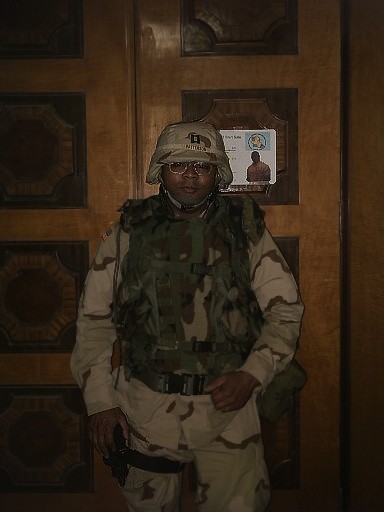By Riley Johnson, News21

Jason Patterson, seen here in Saddam Hussein’s office in the Baghdad Presidential Palace in 2004, served in the unit that governed Iraq after the invasion. (Photo submitted by Patterson)
Jason Patterson’s traumatic experiences in Baghdad’s Green Zone no longer trigger anxiety in parking lots.
The 45-year-old Navy veteran saw a parking lot as a “death trap” with the openness creating easy targets for car bombs. Patterson’s daily stress over six months as a communications support officer in 2004 Baghdad seemed “like six years,” he said.
Patterson retired from the Navy in 2009, but his Iraq experiences crept up on him in ways he didn’t readily notice. On grocery trips in his La Vista, Neb., hometown, he’d park at the far end of the lot, fearing bombs, he said.
In March 2012, Patterson sought therapy for his post-traumatic stress through the Veterans Affairs hospital in Omaha. The program – prolonged exposure therapy –is one of an array of PTSD treatments allowed by the VA. A therapist would ask Patterson to talk about his trauma, and on his own, confront the situations that triggered it.
Terry North, director of the PTSD program for the VA Nebraska-Western Iowa Health Care System, said that prolonged exposure therapy is designed to help veterans “develop a more balanced view of the world. With trauma, their world turns into ‘The world is a dangerous place.’ ”
In his sessions, Patterson would close his eyes and recall his traumas.
“That’s how you open the gate,” he said.
Parked alone in his silver Honda Civic, Patterson confronted his anxiety. The first few times he’d abandon his one-hour goal and leave after 10 or 15 minutes. But over 12 weeks he began to feel more comfortable. He learned to close his eyes, and think of fishing.
Patterson doesn’t fish more than once or twice every few months in the summer, but fishing helps him cope, he said.
“It brings joy, excitement and a sense of peace,” he said. “As long as I’m fishing, I don’t care.”
